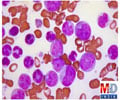Treatment with imatinib and peginterferon alfa-2a was associated with significantly higher rates of molecular responses in people with CML.

Peginterferon alfa-2a is a drug with dual mode of action - both antiviral and on the immune system. This drug has been widely used in the treatment of Hepatitis C and Hepatitis B. The addition of peginterferon alfa-2a to imatinib in patients with CML may reduce the risk of progression and may be associated with long-term survival. Studies suggest that it is important to combine the agents for at least 12 months.
The combination is however associated with substantial toxic effects that often result in the discontinuation of peginterferon alfa-2a. A lower dose of peginterferon alfa-2a (e.g., 45 μg per week) might allow the combination to be given for a longer period. Imatinib–peginterferon alfa-2a combination brings a faster response than the known second-generation tyrosine kinase inhibitors such as dasatinib or nilotinib. Therapy with with imatinib alone may lead to the persistence of leukemic cells. Only a minority of patients treated with imatinib have a complete molecular remission. The addition of peginterferon alfa-2a may increase the efficacy of tyrosine kinase inhibitors.
In conclusion, combining imatinib to peginterferon alfa-2a has been found to bring a better response as suggested by randomised studies. A follow-up on CML patients using imatinib shows an overall survival rate of 89% after five years.
Reference:
The New England Journal of Medicine
Source-Medindia
 MEDINDIA
MEDINDIA


 Email
Email










